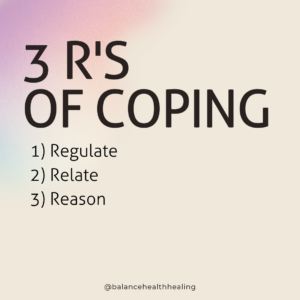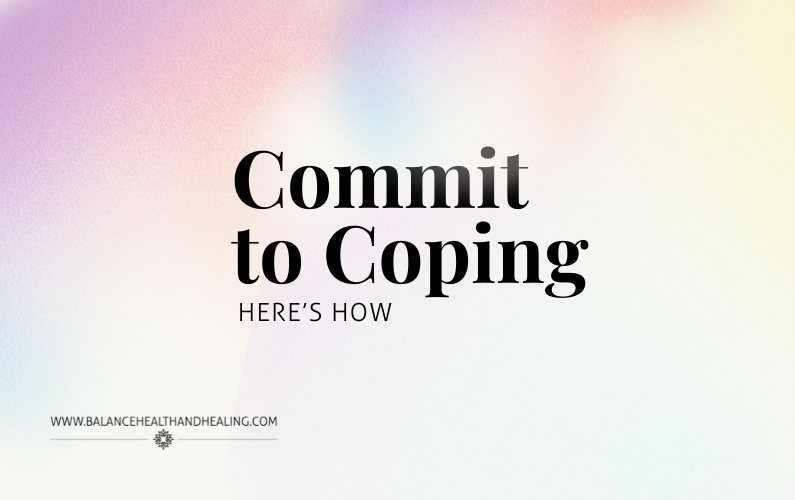How are you doing? No, really, how are you doing? Life can be hard and learning how to really take good care of yourself can take a little time, but it’s so worth the effort.
Coping Skills are for Humans
If you’re a human, congratulations, you need coping skills. Think of stressors as experiences that demand a response by your body. This is where the stress response comes in and it is an incredible system that is designed to keep you safe while facing life’s challenges. 
But this stress response also needs to be dealt with. If you’re like most of us, once you’ve faced a big challenge, whether it’s speaking in public, being cut off in traffic, or having a difficult conversation, you just want to move on. You don’t want to think about the stressor anymore. You’re just glad you got past it.
But, guess what? Your body isn’t past it yet. It’s still having a stress response. Your body is still disrupted by the stressor and it needs your help to get back to homeostasis. So, even though you’ve dealt with the stressor successfully, your work here is not done yet.
Enter Coping Skills
This is where coping skills come in. Effective coping skills are designed to help you move through the stress cycle and return to homeostasis where stress hormones decrease, the immune system calms down, and the parasympathetic system quiets the sympathetic system. When you don’t engage effective coping skills, your body can become stuck in a chronic stress response, making you more sensitized and vulnerable to stressors. In contrast, when you commit to coping with effective skills, you get better at facing challenges and can more quickly return to homeostasis. This is a process by which your brain learns from challenges and you become more resilient to stressors.
3 Rs of Coping
But how you engage coping skills also matters. Because the stress response is a full- bodied and full-brained response, understanding what’s happening during a stress response can help you move through the stress cycle more effectively. These are known as the 3 Rs and they come to us from Dr. Bruce Perry, a trauma specialist.
1 – Regulate
When you face a stressor, your body moves to survival mode with a full-system response designed to keep you alive. This response can include a racing pulse, shallow breathing, temperature shifts, hyper-focus, and loss of appetite.
Given this strong stress response, your first target for coping skills needs to be regulation. Facing a stressor dysregulates your body and so it makes sense that a critical part of returning to homeostasis includes a focus on regulation.
Coping skills designed to help you regulate include paced breathing, sleep, temperature changes, eating, reducing stimuli, and grounding techniques to keep you in the here and now. Regulate coping skills should be your first line of defense as they pave the way for you to benefit from additional coping skills.
2 – Relate
Once you’ve engaged regulation skills, it’s time to focus on the second R, Relate Skills. Because you are a human, you are wired for connection. This means that when life’s stressors threaten you, it’s important to rely on meaningful connection to help you cope and return to homeostasis. This is what it means to be human.
Relate skills include self-compassion, empathy from others, affection, love, and support. You don’t need a loved one to solve your problem or tell you why it wasn’t  a big deal. You need someone to love you and empathize with your emotions of the experience. And you need to do the same with yourself, responding to yourself with self-compassion, not self-criticism.
a big deal. You need someone to love you and empathize with your emotions of the experience. And you need to do the same with yourself, responding to yourself with self-compassion, not self-criticism.
3 – Reason
As you build a strong foundation of coping with Regulate and Relate Skills, you’re ready for some Reasoning, but the truth is, most of us try to jump straight to reasoning skills too quickly and then wonder why we’re still stressed out and feeling self-critical. Bypassing Regulate and Relate Skills leads to short-circuiting the healing process. It makes it more difficult to have an accurate understanding of your experience and leads to poorer reasoning and resolution as a result.
You must attend to first things first. Self-regulation, loving relation, and then reasoning. Reason skills include increasing insight, taking perspective, challenging stories, learning lessons, consolidating memories, and problem-solving. These are important skills that require critical thinking, skills that are difficult to engage without a strong foundation of self-regulation and loving relation.

